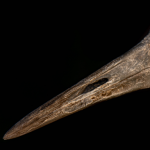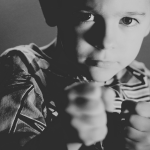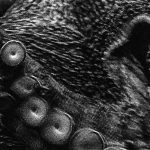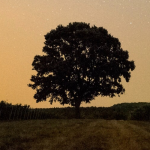On the park bench, headscarf tied over her grey hair, tartan shopping bag by her feet, coat buttoned up tight, she’s throwing bread into the empty pond. Bemused pigeons and sparrows coo and chatter, hoping for wayward crumbs, and passers-by mutter behind smiles. Oblivious, she presses the bread into white cubes and with a practised hand throws the morsel.
The bread is gone, and she upends the empty bag on the grass at the side of the bench, scattering crumbs. The birds flutter and push to get at the leftovers. She looks down at their noisy squabbling then looks up and catches sight of the young man watching her. Maybe she recognises him as the new park attendant, maybe not, but she nods a greeting.
The young man, scrawny and tattooed, dressed in hi-vis work-gear, gives an awkward returning smile. It’s the closest either of them have come to a decent conversation in a long time. He goes back to raking up the fallen leaves, bare fingers far too pink against the stave, skin already beginning crack under autumn’s attention. Head down, he carries on, ignoring and avoiding the looks from the patrons wandering through the park, judging even as they drop their water bottles and empty packets on the paths.
He likes this job. Doesn’t want to lose it, so he doesn’t complain when he picks up their litter with numb fingers that should be shod in gloves had they had his size on the van. There was something soothing in tending, in raking, being treated like the bushes, the grounds. It’s a restful kind of invisibility.
When he’s done, he walks back to his van, where the old lady is waiting. He nods as he gets close, and is surprised by her hand, so light yet so weighty, landing on his arm. Startled he looks up into her rheumy pale blue eyes, sees the powder thick on her face, as though time has covered her in dust that she can’t wipe away. She tuts softly and pulls out her other hand, offering a pair of men’s gloves.
“These were my ‘Enry’s,” she says simply. “He’s dead and don’t need ‘em.”
She presses them against his chest, as though she knows he’s going to refuse but doesn’t care and nudges until he takes them. With the exchange, she sighs and smiles and before he can say anything, she shuffles away, dragging her wheeled shopping bag behind her.
The gloves don’t match her. They’re almost new, pristine, where she is worn and life has left its mark on everything she is and has. But they’re warm, and his aching fingers are grateful even if he has yet to learn how to be comfortable with gratitude.
Some teenagers point and snigger, spit out words, but continue past. He watches them carefully, shaking his head as they fling their cigarettes and coke cans on the grass. He’s only a few years older than them, even recognised one from his old school, but he’s never felt so far removed before. It’s like when he saw his face in the mirror after rehab and couldn’t believe he had anything in common with the face staring back at him. He feels closer to her, this strange old biddy who feeds nothing every day, who wanders around with what must be all she has before going wherever she goes when the park closes. His fingers flex in the warm gloves.
He’s entitled to a fifteen minute break, and he takes it, sitting down on the same bench, as far as the wooden seat allows, close enough to know he’s sitting with her. She looks over, smiles, tilts her head towards the gloves, as though he’s done her the favour. She offers the bread, shaking the bag so a slice falls over and confused but content, he reaches inside.
“Got to squeeze it firm,” she explains eagerly, coaxingly, showing him with her own bent fingers.
He follows her, fascinated as it becomes like dough, and then he hurls it, where it sinks like a stone.
“The ducks aren’t goin’ to get that,’ he says softly.
The old lady chuckles gently. “It ain’t for the birds.” She settles back with a grimace. “The birds here are sweet and chatty and people like ‘em, so they get fed. People buy that expensive stuff from pet stores and feel good for feedin’ them. The birds are happy and fat, and when you hear ‘em, you can hear ‘em asking for more even though they’re bound to get,” she finishes with something approaching disdain.
“What you feedin’, then?” he asks, curious, yet somehow knowing the answer in his warm fingers and cold feet…because the boss hasn’t ordered his work boots yet.
“The fish. Them that are unseen and forgotten…the ones that can’t ask and are left to starve while the greedy just get greedier. So like people,” she adds, squeezing her piece of bread until it bursts out between finger and thumb like an infection.
Next morning, he avoids her, can’t watch her throwing her bits of bread. At home, he’d googled feeding fish bread, found out what it did to them, what it lead to, and from the way her gnarled fingers had worked tirelessly and her eyes watched, he knew she knows too.
His bare fingers tingle in the cold air, the gloves rest uncomfortably in his pockets, and he feels sick at the thought of wearing a dead man’s pair of gloves, wondering if her ‘Enry had been a greedy sparrow or a fish gobbling up its doom at the end. How many ponds had she sat at in her long life dispensing her kind of help? The works van pulls up, and his boss calls out. He stands up, walks over, gets in.
“I want me work gloves and boots for Monday,” he says simply.
The older man nods, hears something that wasn’t there before. “Right you are.”
…
Biography
Sian Brighal currently lives in Germany with her family and is using the break in teaching to delve into flash fiction writing. She can be found on twitter under @sian_ink.
Image: unsplash.com





